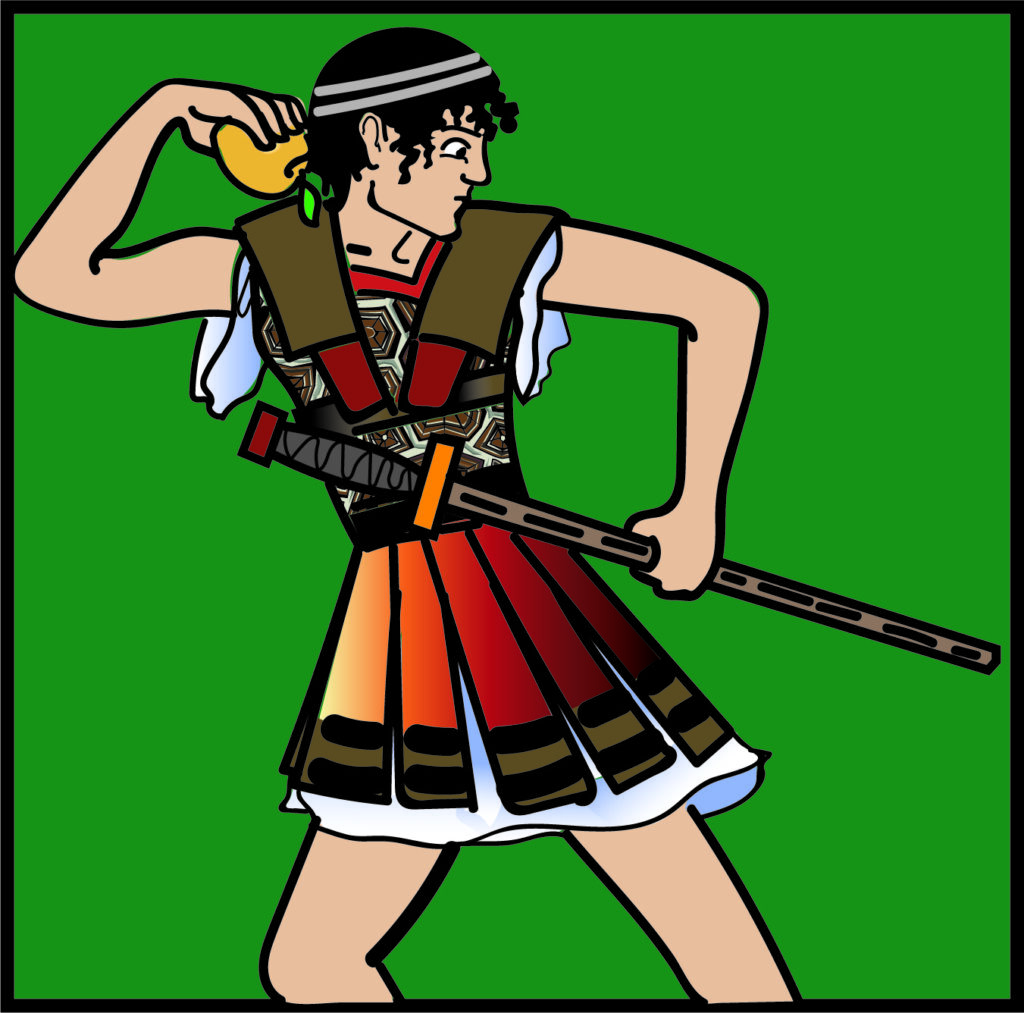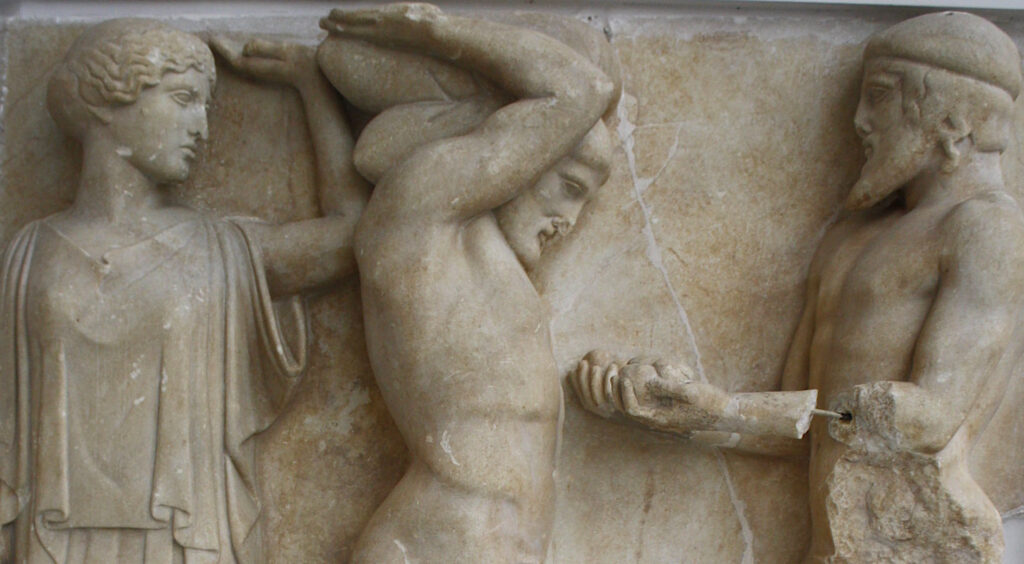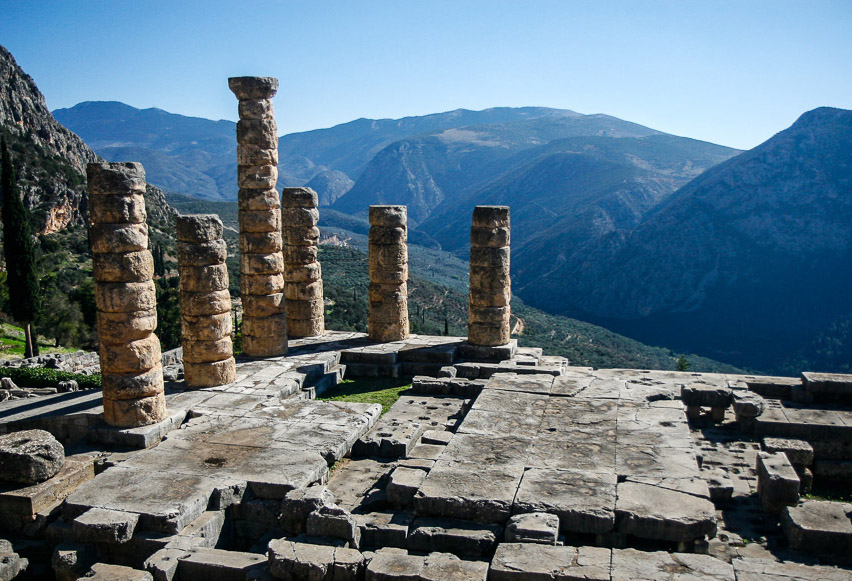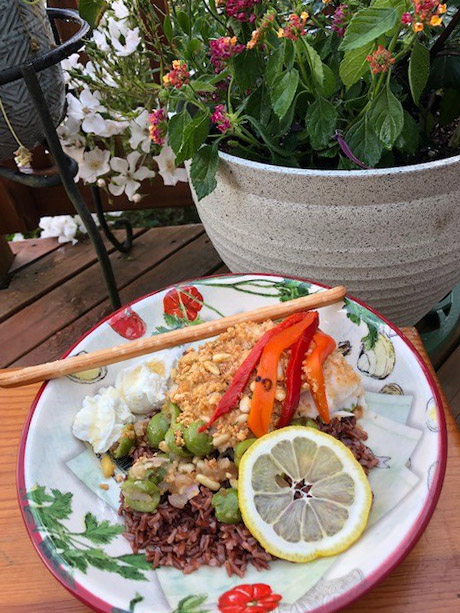The Tale Behind the Tale of…
Hercules and the Golden Apple

The decision to write and produce, “Hercules and the Golden Apple”, a musical about this particular part of the Greek myths of Hercules sprang from a book I read many years ago. It was a collection of Greek myths but was written in a very fun and modern way – the book was published in the 1920’s so the word ‘modern’ is relative. Unlike so many of the other Greek myths, including the ones about Hercules, this myth involved cunning and cleverness rather than brute strength and divine intervention. It stuck in my memory. After over forty years, I was browsing in a used book store and came across a copy of the same book I’d read all those years ago and again found the myth of Hercules. Around that same time, I was given a commission to write a story about a ‘hero’. It was fate – or maybe it was one of Athena’s clever plans – that I write a musical version of this story.
Heracles or Hercules?
Some people are quick to correct the use of Hercules when retelling one of the ancient Greek myths about this popular hero. The complaint is that the true Greek name of the demigod son of Zeus is Heracles (pronounced like Hair-a-kleez). And that’s not even his given name. The name given to him by his mother, Alcmenes, was Alcaeus. Even before his birth the jealous goddess, Hera wife of Zeus, tried to kill Hercules. She even sent poisonous serpents to murder the young Hercules as he lay in his cradle at age two. But with his god-like strength the toddler strangled the snakes and survived. It was because of his constant battles with Hera that the boy took the name ‘Heracles’ which means ‘Glory of Hera’. It signified that he would gain fame and glory because of Hera.
When the empire of ancient Rome absorbed the ancient Greek empire, they also absorbed many of the Greek myths and gods. The story of Heracles was one of their favorites. Like many Greek gods and demi-gods, the Romans gave them Latin names. So, Heracles was renamed, Hercules. Because much of Western European history and language comes from the ancient Romans, today Hercules is the name for this Greek hero that most of us recognize.
The 12 Labors of Hercules

The story of Hercules retrieving two golden apples from the Garden of Hesperides is only one of the twelve labors Hercules was required to do by the Oracle of Delphi. He was in debt to King Eurystheus of Tiryns, a kingdom in Mycenae. Hercules, in a fit of rage and delusion caused by Hera, killed his family. To atone for this act, he became indebted to King Eurystheus. A favorite of Hera’s, the king conspired with her to use the labors to put an end to Hercules by making the tasks so difficult and dangerous it seemed unlikely the arrogant son of Zeus would survive.
Initially, the Oracle only assigned Hercules ten labors. But when he returned from successfully seizing the cattle of the giant, Geryon, Eurystheus accused Hercules of getting help to complete two of the ten labors. So the king and the Oracle assigned Hercules two additional labors.
The Twelve Labors included:
- The slaying of the Nemean Lion (Hercules skinned the lion and wore its skin from then on)
- The slaying of the nine-headed Hydra
- The capture of the Stag of Arcadia
- The capture of the Wild Boar of Mt. Erymanthus
- Cleaning the stables (in one day) housing the cattle of King Augeas
- Traveling to the Stymphalian marshes and shooting the giant, man-eating birds that lived there
- The capture of the mad bull of Crete
- Capture the man-eating mares of King Diomedes
- Capturing the magic belt of Hippolyta, Queen of the Amazon women
- Seizing Geryon’s herd of cattle
- Bringing two Golden Apples from Hera’s secret garden of Hesperides to King Eurystheus
- Going to the Underworld and bringing to the surface the three-headed guard dog, Cerberus
The Greek Chorus sings about Hercules’ accomplishments in the podcast
Who was the “Oracle of Delphi”?

The person who created the list of labors Hercules needed to fulfill was the Oracle of Delphi. The Oracle and the priests and priestesses who interpreted her predictions were extremely powerful in ancient Greece. They lived at the Temple of Apollo near the town of Delphi just six miles or so from the Gulf of Corinth. The Temple was the seat of the cult of Apollo. In the very early days of Greek civilization, kings and important citizens came to the temple to ask the Oracle a question. The young woman who was chosen to be the Oracle from among the elite of group of Apollo’s cult followers, would go into a trance and predict the future or give advice. Sometimes she’d sit behind a curtain when giving her predictions. Other times she’d sit on a three-legged chair. The number three had great importance in the cult of Apollo. Based on mythology, the Thriae or three winged sisters of Parnassus taught Apollo how to predict the future. Initially, all the Oracle or Pythia’s predictions came in the form of a poem but, as the civilization declined and the cult lost power, the Oracle was chosen from less educated priestesses at the temple so later Oracles were not as skilled in the literary arts.
According to accounts, the Oracle or Priestess of Pythia, achieved her trance by dancing to exhaustion, sleeping in the holy place and dreaming, or meditation. It’s also rumored that her trance was achieved by inhaling the hydrocarbon fumes produced through a opening in the ground at the base of Mount Parnassus.
The Greek tradition of Storytelling
Most of what we know about the ancient Greeks comes from their stories. The Greeks loved telling and listening to stories. Rhapsodes, traveling storytellers, would journey from city to city, island to island and tell familiar myths about the gods and heroes, famous battles, or terrifying monsters. Often, they’d recite the stories in song or poetry perhaps inspired by Calliope, the muse of Epic Poetry. It was their love of stories that led to the Greek’s invention of theater as we know it today. That includes having a chorus to help move the plot along by singing, reacting, and creating continuity and context. Like the ancient Greeks, the cast of our Winking Kat Tales’ adaptation of “Hercules and the Golden Apple” thoroughly enjoyed performing their musical version of the ancient myth.

The Nymphs share their favorite fish recipe with us
A delicious way to prepare a fish dish with a little Greek flair.

Serving for two
Prepare your favorite rice (the rice pictured in the photo is wild, red rice)
Set oven temperature for 425 degrees F
Ingredients:
- 1 medium shallot (chopped)
- ½ cup Castelvetrano olives (pitted and halved)
- 2 Tbsp minced garlic
- 2 Tbsp chopped chives
- 3 Tbsp chopped parsley (plus some for garnish if desired)
- 4 Tbsp butter (2 for pan, 2 for before baking)
- 3 fillets of firm white fish (monkfish, sole, cod, etc)
- 5 Tbsp virgin olive oil (2 for pan, 3 for bread crumb mixture)
- ¼ cup white or light rosé wine
- 4 Tbsp white wine vinegar
- ¼ cup fresh lemon juice (about the juice from one med lemon)
- ¾ cup bread crumbs (seasoned with salt and pepper to taste)
- ¼ cup pine nuts
Prepare all your ingredients. Have a skillet and a glass or ceramic baking pan ready.
In the skillet melt 2 tablespoons of the butter along with 2 tablespoons of olive oil. Add the chopped shallot and sauté until pieces just begin to become transparent. Add the garlic. Stir until it begins to brown. Add the wine, halved olives, lemon juice, vinegar, parsley, and chives. Sauté and mix everything together, then pour the mixture into the baking dish.
Place the fish fillet on top of the mixture.
Add the pine nuts, salt, and pepper to the bread crumbs. Drizzle in the 3 tablespoons of olive oil to moisten the bread crumb mixture. Spoon the bread crumb mixture over the fish and gently mold it to cover. Break apart the remaining 2 tablespoons of butter and place in pieces over the bread crumb mixture. Place baking dish uncovered in the oven.
Bake for 10 – 20 minutes depending on the thickness of the fish. If it looks like the bread crumbs are drying out, spoon some of the wine/olive mixture over the fish. When you think it is done, test the fish to make sure it flakes properly but isn’t too dry.
When the fish is cooked, divide the cooked fillet into individual servings and place on a bed of the cooked rice. Spoon the wine/olive mixture over the top. If you like, you can garnish with dollops of goat cheese drizzled with honey, parsley, roasted red pepper strips, and lemon slices.
Kalí órexi means ‘Enjoy your meal’
